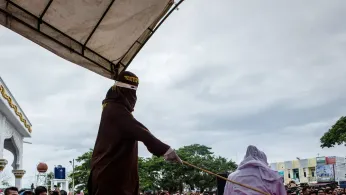
Aug 12
Two Young Men Sentenced to Public Caning for Kissing in Indonesia
READ TIME: 3 MIN.
Authorities in Indonesia’s Aceh province have reportedly sentenced two young men to public caning after police alleged the pair kissed each other in a public restroom, in a case that has sparked renewed criticism from human rights advocates and LGBTQ+ organizations.
According to reporting from PinkNews and The Advocate, the men—described as being 20 and 21 years old and identified as college students—were arrested in April after police intervened at a park restroom and were sentenced on Monday, August 11, by an Aceh court that enforces local Sharia-based regulations.
Both outlets report that the punishment consists of 80 strokes of the cane, a sanction that Aceh authorities have previously applied in cases involving consensual same-sex intimacy under local ordinances.
Aceh is the only province in Indonesia that implements Sharia-based bylaws, known locally as Qanun Jinayat, which criminalize consensual same-sex intimacy and prescribe punishments including public caning. While Indonesia’s national law does not criminalize consensual same-sex conduct, Aceh (and certain localities with Sharia-inspired ordinances) operates under a special autonomy arrangement that allows enforcement of these bylaws.
In prior years, Aceh authorities have carried out public canings following convictions for consensual same-sex intimacy, drawing international condemnation from rights groups and UN experts. In a widely reported 2019 case in Banda Aceh, two men were sentenced to 80 lashes for what the Islamic court determined was gay sex, highlighting the province’s continuing use of corporal punishment against LGBTQ+ people. Human Rights Watch and other organizations have repeatedly called for Aceh to repeal Qanun Jinayat provisions that criminalize consensual relations and authorize corporal punishment.
The reported arrest and sentencing come amid broader pressures facing LGBTQ+ communities in Indonesia. PinkNews’ report notes a June police operation in West Java in which 75 people were arrested in Bogor after what authorities described as a raid on a “gay party,” and references proposed legislative changes to broadcasting rules that would restrict investigative journalism and LGBTQ+ content. The Advocate similarly frames the sentencing within the context of Aceh’s unique legal environment and its history of public corporal punishment.
In 2022, Indonesia’s parliament passed a new national criminal code set to take effect in stages, which criminalizes sex outside marriage and has been criticized by rights organizations for potential impacts on privacy, expression, and marginalized communities, including LGBTQ+ people who cannot legally marry. While the national code does not explicitly criminalize same-sex relations, advocates argue that provisions policing morality and cohabitation could amplify surveillance and harassment of LGBTQ+ people.
International human rights standards, including guidance from the United Nations and the World Health Organization, reject criminalization of consensual same-sex intimacy and denounce corporal punishment as cruel, inhuman, or degrading treatment. UN human rights experts have previously urged Indonesia to end public canings and repeal discriminatory bylaws in Aceh, emphasizing that such measures violate Indonesia’s international obligations under treaties such as the International Covenant on Civil and Political Rights.
LGBTQ+ organizations in Indonesia and the region have consistently called for greater protections, including the decriminalization of consensual relations, prohibition of corporal punishment, and safeguards for privacy and free expression. Advocates also emphasize the need for safe reporting mechanisms for discrimination and violence, along with public education campaigns that affirm the dignity and human rights of lesbian, gay, bisexual, transgender, queer, and intersex people. These calls have been echoed by international civil society groups following previous caning cases in Aceh.






